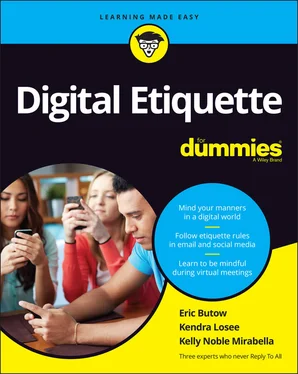Eric Butow - Digital Etiquette For Dummies
Здесь есть возможность читать онлайн «Eric Butow - Digital Etiquette For Dummies» — ознакомительный отрывок электронной книги совершенно бесплатно, а после прочтения отрывка купить полную версию. В некоторых случаях можно слушать аудио, скачать через торрент в формате fb2 и присутствует краткое содержание. Жанр: unrecognised, на английском языке. Описание произведения, (предисловие) а так же отзывы посетителей доступны на портале библиотеки ЛибКат.
- Название:Digital Etiquette For Dummies
- Автор:
- Жанр:
- Год:неизвестен
- ISBN:нет данных
- Рейтинг книги:5 / 5. Голосов: 1
-
Избранное:Добавить в избранное
- Отзывы:
-
Ваша оценка:
- 100
- 1
- 2
- 3
- 4
- 5
Digital Etiquette For Dummies: краткое содержание, описание и аннотация
Предлагаем к чтению аннотацию, описание, краткое содержание или предисловие (зависит от того, что написал сам автор книги «Digital Etiquette For Dummies»). Если вы не нашли необходимую информацию о книге — напишите в комментариях, мы постараемся отыскать её.
Digital Etiquette For Dummies,
Digital Etiquette For Dummies
Digital Etiquette For Dummies — читать онлайн ознакомительный отрывок
Ниже представлен текст книги, разбитый по страницам. Система сохранения места последней прочитанной страницы, позволяет с удобством читать онлайн бесплатно книгу «Digital Etiquette For Dummies», без необходимости каждый раз заново искать на чём Вы остановились. Поставьте закладку, и сможете в любой момент перейти на страницу, на которой закончили чтение.
Интервал:
Закладка:
Etiquette versus online ethics
In trying to wrap your mind around the notion of etiquette, you need to be able to distinguish between ethics and etiquette . You may have heard both terms used interchangeably when people talk about online behavior. If you think they’re the same, lose that thought like you lose the TV remote.
The term etiquette is the code, at times unspoken, that indicates the polite way to behave in a society. Ethics is a set of moral principles that tells you what’s good and what’s bad. In a movie, you may have seen a character who you know is a bad guy but who acts politely toward everyone in the film; the perfect manners don’t fool you, because you know that the bad guy is still a villain who is naturally immoral.
Some behaviors also fall under the definition of bad ethics, which may help explain why people confuse the terms. For example, someone who lies and cheats to get what they want, no matter whether it happens in person or online, displays behavior that belies a deeper problem — we’re talking about someone who cannot think ethically.
 If you want to read more about the differences between ethics and etiquette, the Pediaa site has a good overview at
If you want to read more about the differences between ethics and etiquette, the Pediaa site has a good overview at https://pediaa.com/difference-between-ethics-and-etiquette .
Seeing Which Situations Call for Etiquette
Certain rules of etiquette apply all the time, such as sneezing into your arm or elbow. (That’s polite behavior no matter whether you’re in a pandemic.) Other rules apply to specific situations, such as chatting with others in an online meeting.
 How you behave ethically online can impact your ability to make a living. It’s now standard procedure for an employer to examine your social media profiles before deciding whether to accept your application, let alone contact you about an interview. If you want to keep certain information private, change the privacy settings on your profiles to show them only to specific connections, such as people on your friends list.
How you behave ethically online can impact your ability to make a living. It’s now standard procedure for an employer to examine your social media profiles before deciding whether to accept your application, let alone contact you about an interview. If you want to keep certain information private, change the privacy settings on your profiles to show them only to specific connections, such as people on your friends list.
General rules of etiquette are in effect all the time, and others are specific to each situation. You must know the basics of good manners online, and this opening chapter offers the perfect opportunity to give you a 30,000-foot overview of how to apply etiquette online.
 Before you forge ahead, stop for a moment and remember that what you do can also affect you legally. Have you ever heard anyone say, “What’s on the Internet stays on the Internet”? Though it’s unclear whether that statement will remain true over time, it is certainly true now. So, with your behavior recorded for others to find, do you doubt that you need online etiquette? (By the way, we delve into the legal issues of online behavior in Chapter 2.)
Before you forge ahead, stop for a moment and remember that what you do can also affect you legally. Have you ever heard anyone say, “What’s on the Internet stays on the Internet”? Though it’s unclear whether that statement will remain true over time, it is certainly true now. So, with your behavior recorded for others to find, do you doubt that you need online etiquette? (By the way, we delve into the legal issues of online behavior in Chapter 2.)
Social: Chatting with others
Social situations have rules in place that you’re probably familiar with, such as not saying things that you know would be hurtful to another person. Without standing physically in front of someone, though, it’s easier for us to forget that we’re actually talking to a real person, even if they aren’t physically present.
So, whenever you’re chatting with friends online, take the opportunity to review what you should be doing in social conversations — what passes for good etiquette, in other words. As you read, think about whether and how you’re following these rules so that you can train yourself to chat with others more effectively.
Hold a good conversation
Just as in a face-to-face chat, learn how you can hold a back-and-forth dialogue online. If you monopolize a discussion where you’re the one saying most everything, don’t be surprised if you’re called a troll — a person who is intentionally harmful to gain attention and/or cause trouble. It won’t be long before people start finding ways to avoid you.
Avoid gossip at all costs
It’s easy on social media to succumb to the urge to gossip, especially if the person you’re gossiping about isn’t included in the group of people you’re talking with. Don’t let yourself believe that private online groups are safe, though, because — just as with in-person gossip — online gossip finds a way to get back to the person you’re talking about. Then, like all gossip, it boomerangs on you.
Engage
Social media and other forms of online communication make it easy for you to ignore everything that other people write. After all, no one knows whether you’re actually paying attention, right?
If you’ve posted something, however, you may get some feedback on those posts from your friends and other people who can see your posts. It’s good form to respond to people with a personal thank-you message or a clicked Like icon — or both.
Even if you don’t want to type anything in response, clicking the Like icon next to the comment lets the commenter know that they’ve been recognized and that their comment is valuable. And, you may not know it, but you’ve improved your social standing with as little effort as a click or tap. If you see this person offline, your real-life social standing grows a little, too.
Connect positively
If you find a comment that you want to talk about, don’t be afraid to express your opinion by typing your own comment in response. Before you start typing, though, shift into the right mindset and make sure that it’s a healthy conversation.
In online discussions, you’re likely talking to a real person. So, if you think that the conversation runs the risk of turning into an argument where both you and the other person become angry — and you both look bad to anyone else participating — consider not saying anything.
 If you want to connect with others by taking photos of your friends, ask for permission before you tag them in your photos. Facebook, Instagram, and other social network sites allow you to tag photos so that all the friends of your friends can see the photo, too — though your friends may not appreciate it.
If you want to connect with others by taking photos of your friends, ask for permission before you tag them in your photos. Facebook, Instagram, and other social network sites allow you to tag photos so that all the friends of your friends can see the photo, too — though your friends may not appreciate it.
Think before you post
There are several good reasons not to post something objectionable or even threatening — including the quite established fact that it can land you in hot water with your friends or even with law enforcement. Have you, or has someone you know, done one of the following?
You shared unflattering photos of your friends and then were baffled that they were upset — at least until your friends posted unflattering photos of you and then you started to get the message.
You left a comment on a false story without checking with one or more credible sources, like major news organizations and/or fact-checking sites like Snopes that have a database of stories that are shown to be false or true — or a mixture of the two.
You posted about doing something illegal because you thought it made you look cool to your friends, but instead you got in trouble with the law. For example, someone contacted law enforcement when they saw that you bragged about drinking, driving home drunk, and arriving home without a scratch — except when you hit a couple of parked cars but managed to drive off with no trouble.
Читать дальшеИнтервал:
Закладка:
Похожие книги на «Digital Etiquette For Dummies»
Представляем Вашему вниманию похожие книги на «Digital Etiquette For Dummies» списком для выбора. Мы отобрали схожую по названию и смыслу литературу в надежде предоставить читателям больше вариантов отыскать новые, интересные, ещё непрочитанные произведения.
Обсуждение, отзывы о книге «Digital Etiquette For Dummies» и просто собственные мнения читателей. Оставьте ваши комментарии, напишите, что Вы думаете о произведении, его смысле или главных героях. Укажите что конкретно понравилось, а что нет, и почему Вы так считаете.












